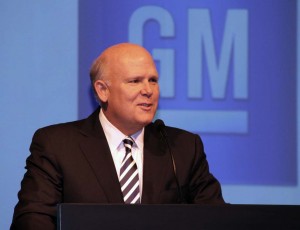Officially, the White House could begin selling off the Treasury’s remaining 500 million shares of General Motors stock once a so-called lockup period expires later this month, but sources are warning the government will likely not make any move until August – and possibly could wait until next year.
With investors wary of automotive stocks at a time of rising gas prices and wavering economic issues – and with GM shares, in particular, being pummeled in recent weeks – the Obama Administration appears wary of making a move too soon, as selling off those shares now could mean a $9.5 billion loss on the GM bailout.
But while Washington may be wary of what’s happening at the automaker, CEO Dan Akerson appears to be putting his money where his mouth is, investing nearly $1 million to acquire 30,000 shares of GM stock this week, bringing his total holdings to 50,000 shares. At $31.33 a share — $939,000 in total — Akerson got a bargain compared to those who paid $33 a share when GM launched its long-awaited IPO last November.
Nonetheless, many analysts believe the maker could see its stock surge as high as $50 or more, over the next couple years, once the U.S. automotive market recovers and GM, in particular, demonstrates it can deliver consistently solid returns after its 2009 bankruptcy.
It did ring up a $3.2 billion profit for the first quarter of 2011, but roughly half that figure came from one-time gains, while hefty incentives ate into GM’s earnings from its core North American automotive market.
Officially, the White House isn’t discussing its plans beyond acknowledging it will eventually cash out of GM – and Chrysler, which also received a post-bankruptcy bailout two years ago.
(Chrysler CEO Sergio Marchionne plans to pay off the maker’s government loans by June and then may increase Fiat’s stake to 70%. Click Here for that story.)
Last month, Akerson told reporters he was equally in the dark about the Administration’s plans. “I don’t know what’s going to go into their calculus,” he said. “I think there are many, many variables in their consideration, and they don’t share that with us.”
Prior to the November 2010 IPO, both GM and Washington were under heavy pressure to severe – or at least reduce – their ties, critics routinely referring to the automaker as “Government Motors.” Some conservative commentators, including Rush Limbaugh, had even called for a boycott of the maker’s products, suggesting they’d be happy to see it go out of business.
Since the IPO – and, more significantly, since GM’s sales and earnings have started to rebound, the pressure has somewhat subsided. Meanwhile, GM has announced billions in new investments that will create more than 10,000 new U.S. jobs. And with new products generating overall favorable reviews, it has begun seeing momentum in its showrooms, even without incentives.

